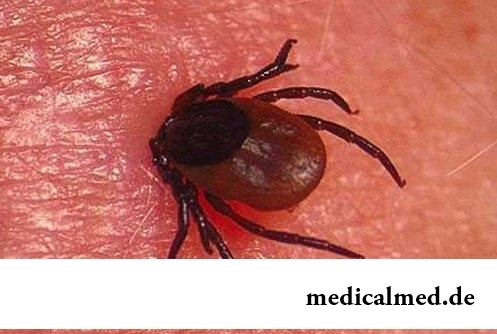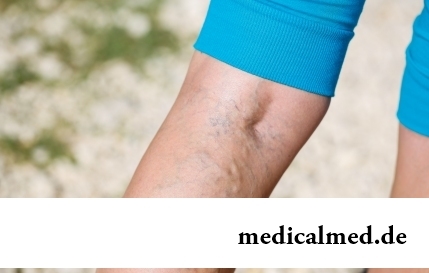





Tick-borne encephalitis
Short characteristic of a disease
 Tick-borne encephalitis is a viral disease which is caused by ixodic mites, leads to defeat of the central and peripheral nervous systems, causes the heavy complications which are coming to the end with paralysis and a lethal outcome.
Tick-borne encephalitis is a viral disease which is caused by ixodic mites, leads to defeat of the central and peripheral nervous systems, causes the heavy complications which are coming to the end with paralysis and a lethal outcome.
Ixodic mites are widespread in forest and forest-steppe zones with a temperate climate. Several species of these parasites are known, but, as a rule, a tick-borne encephalitis arises after Ixodes Persulcatus stings (a taiga tick) or Ixodes Ricinus (the European forest tick). The first is more widespread in Asia, the second – in the territory of the European region. In Russia prevention of a tick-borne encephalitis is especially urgent for residents of Siberia, the Far East, the Urals and the central regions of the country.
Strict seasonality is characteristic of a tick-borne encephalitis. Cases of a tick-borne encephalitis are registered in spring and summer months when activity of carriers of an infection increases. As for infection, it occurs directly after a sting and the subsequent krovososaniye of the victim. Besides, the virus of a tick-borne encephalitis can be transmitted through a digestive tract at the use of raw milk from sick cows.
Symptoms of tick-borne encephalitis
The average duration of an incubation interval of an infection makes 7-14 days. At initial stages a tick-borne encephalitis proves the following symptoms:
- numbness of face skin and neck;
- weakness in extremities and muscles;
- fever;
- fervescence up to 400;
- sharp headache;
- nausea, vomiting;
- bystry fatigue;
- sleep disorders.
In the acute period at patients with a tick-borne encephalitis the hyperemia of a neck, person and breast, and also an injection of scleras and conjunctivitis is noted. People are disturbed by severe pains in extremities and muscles, especially where paralyzes and paresis will be shown further. Besides, in an onset of the illness the virus of a tick-borne encephalitis can lead to frequent losses of consciousness and feeling of an oglushennost. In process of development of a disease these symptoms often develop into states close to a coma.
Clinical picture
Now specialists allocate 5 forms of a tick-borne encephalitis, each of which is characterized by any leading syndrome of a disease.
- feverish – duration of fever makes 3-5 days. This form differs in a favorable current and bystry recovery if, of course, vaccination was done to the patient against a tick-borne encephalitis in time. The main symptoms of a disease are: nausea, headache, weakness;
- meningeal – the most widespread option of an infection. Patients suffer from severe headaches, nausea, dizzinesses, vomiting, eye pains. The person becomes sluggish and slowed down, and unpleasant symptoms are steady throughout the entire period of treatment and can keep even at a normal temperature. In samples of cerebrospinal fluid a large amount of protein is found;
- meningoentsefalitichesky – differs in a heavy current. A tick-borne encephalitis leads to psychomotor excitement, nonsense, hallucinations, orientation loss, epileptic seizures. At patients paresis, a cerebellar syndrome, myoclonias quickly develop. At defeat of the vegetative centers the disease provokes development of a syndrome of gastric bleeding with a plentiful hematemesis;
- poliomiyelitichesky – is diagnosed almost for 30% of sick people. They complain of bystry fatigue, a febricula, sudden development of weakness in any extremity (further it with high probability will be subject to motive disturbances). Also sluggish paresis of cervicobrachial localization is frequent. Symptoms of a disease of a tick-borne encephalitis quickly progress. If the tick-borne encephalitis inoculation was late, at the end of the 2-3rd week at patients the atrophy of muscles develops;
- poliradikulonevritichesky – is characterized by defeat of peripheral roots and nerves, disorders of sensitivity, sluggish paralyzes of legs which can extend to muscles of hands and a trunk.
Acute management at a tick-borne encephalitis.
 At the first suspicions of tick-borne encephalitis of the patient it is necessary to hospitalize urgently in infectious department. Treatment is carried out by the general principles with observance of a bed rest and the maximum restriction of mobility for minimization of pain stimulations. As the virus of a tick-borne encephalitis causes functional disturbances of a liver, stomach and intestines – to patients the rigid diet, and also reception of vitamins of group B and C for recovery of vitamin balance is appointed.
At the first suspicions of tick-borne encephalitis of the patient it is necessary to hospitalize urgently in infectious department. Treatment is carried out by the general principles with observance of a bed rest and the maximum restriction of mobility for minimization of pain stimulations. As the virus of a tick-borne encephalitis causes functional disturbances of a liver, stomach and intestines – to patients the rigid diet, and also reception of vitamins of group B and C for recovery of vitamin balance is appointed.
Causal treatment comes down to purpose of homologous gamma-globulin which is entered intramusculary once a day. At full capacity the tick-borne encephalitis inoculation begins to work already in 12-24 h: body temperature decreases, headaches disappear, overall health improves.
Modern ways of treatment of a tick-borne encephalitis assume use of drugs of interferon which are administered intramusculary, intravenously or endolimfatichesk.
Prevention of a tick-borne encephalitis
At departure on the nature during the spring and summer period it is necessary to remember elementary care. For protection against mites put on clothes which close hands and legs, use repellents. There is also more efficient way to win against a tick-borne encephalitis – vaccination to which adults and children (from age of 12 months) after survey at the therapist are allowed.
If nevertheless the tick could bite the victim, then it is necessary to remove accurately a parasite and to address to infectious diseases hospital for carrying out researches on infectiousness a tick-borne encephalitis. Remember that serum is effective only within the first days from the moment of a sting therefore you should not postpone a visit to the doctor and to wait for unpleasant symptoms of a tick-borne encephalitis. Believe, after their emergence it will be far more difficult to get rid of a disease.
If your liver ceased to work, death would come within a day.

Vitamin complexes belong to the most popular drugs, probably, in our country there is no person who was not hearing about a floor...
Section: Articles about health
Practically each person is familiar with the annoying, pulling, unscrewing pains caused by overcooling of muscles of a back. In certain cases inflammatory process is not limited to discomfort, being followed by emergence of hypostasis, consolidations, increase температ...
Section: Articles about health
Producers of milk mixes for children assure: mixes are ideally balanced and adapted for needs of babies. If mother should raise artificially the kid owing to serious problems with health, to do nothing – it is necessary to feed with substitutes of milk. However pediatricians note that not seldom women without good reasons refuse feeding of the child a breast and pass to milk mixes. Common causes of such decision – the aspiration to leave quicker...
Section: Articles about health
Partial and the more so full loss of hearing significantly reduces quality of life. Difficulties with communication lead to loneliness and замкн...
Section: Articles about health
Contrary to popular belief, the multiple sclerosis (MS) is not connected neither with sclerous changes of walls of vessels, nor with age forgetfulness and problems with concentration of attention. This disease has the autoimmune nature. Pathological process of a vyrazh...
Section: Articles about health
Bulimia and anorexia, are heavy deviations of a feeding behavior, become a cause of death of patients much more often than all other nervous breakdowns combined. In 60% of cases two illnesses accompany each other: patients feel horror before danger of set of excess weight and try to refuse as often as possible food, but periodically suffer from attacks of sudden hunger and an uncontrollable overeating. Each patient with anorexia and bulimia needs the help qualified пс...
Section: Articles about health
Within several decades of our compatriots convinced that the use of butter nasty affects on...
Section: Articles about health
Summer in the heat. Many are going to spend vacation abroad. Travelers the tender seas, rest on beaches wait, for sightseeing, campaigns on natural and cultural reserves. But, unfortunately, on vacation also problems about health can wait for us...
Section: Articles about health
A little more than a century ago goat milk was a traditional food stuff of most of Russians. Unfortunately, today on tables of our compatriots it appears extremely seldom. The reason that the use of so useful product practically came to naught, not only in very modest volumes of its production and, respectively, rather high cost. Potential consumers are just insufficiently informed on unique properties of goat milk and that advantage which...
Section: Articles about health
Household skills which to us so diligently imparted in the childhood it appears, not always bring only benefit. According to result...
Section: Articles about health
Water with a lemon - idle time in preparation drink which supporters of a healthy lifestyle already managed to appreciate. Used in a warm look and on an empty stomach, it is one of the most useful prophylactics allowing to prevent tens з...
Section: Articles about health
Doctors claim that the people not so familiar with a dorsodynia occur among adult Russians very seldom. At the same time the vast majority of the patients who are periodically testing this indisposition do not hurry to ask for medical care at all. On the one hand, there is an opinion that feelings of this sort at mature age are nearly natural phenomenon which is not doing serious harm to health. With another – practice of self-treatment various obezbol is eurysynusic...
Section: Articles about health
An eye of the person daily experiences considerable strain. The problem of preservation of sight is for many years directly connected with a question снабж...
Section: Articles about health
The popular expression "run from a heart attack" became the motto of the people supporting active lifestyle. Moreover, run became a peculiar fashionable tendency: sales of racetracks and the accompanying goods for run are at permanently high level. Really...
Section: Articles about health
It is known that the person for 80% consists of water which participates in all processes of an organism. The person loses liquid daily – as a result of sweating, breath, an urination, and its insufficient completion due to various reasons can lead to dehydration of varying severity. Dehydration (dehydration) occurs already in case of loss of liquid in number of 1% of body weight and can result both in easy thirst, and by the death. In time to notice signs обезвож...
Section: Articles about health
Today about 30 diseases, sexually transmitted are known. To wide circulation of these illnesses extremely with...
Section: Articles about health
Proofs of efficiency of Mildronate at treatment of coronary heart disease with stenocardia can be found in many publications of the end of the twentieth century. Researches were conducted since 1984, including placebo - controlled effects. In total клиничес...
Section: Articles about health
The technique of acupuncture (acupuncture) is used in the medical purposes more than three and a half millennia. It is eurysynusic and recognized as official medicine in the majority of the developed countries of the world. Influence by fine needles on so-called points of acupuncture contributes to normalization of a metabolism and hormonal background, activates protective forces of an organism, has anesthetic and antiinflammatory effect, stabilizes a condition of mentality....
Section: Articles about health
The pancreas performs two functions in a human body: release of enzymes without which digestion carbohydrate is impossible...
Section: Articles about health
It is possible to find the extensive range of fruit and vegetables in modern shops. Russians already got used that on counters there is not only a seasonal domestic production, but the vegetables and fruit which are grown up in the countries with more comfortable conditions at all seasons of the year...
Section: Articles about health
Each failure in work of bodies and systems of a human body is, as a rule, shown by the whole complex of symptoms. In particular, malfunctions with health often cause emergence of cosmetic defects in the form of rashes on a face. Experienced doctors know that localization of heat-spots usually depends on what disease the patient has....
Section: Articles about health
The varicosity has familiarly many, statistically, this disease more than a half of all adult population. As...
Section: Articles about health
With age in a human body harmful substances collect. We receive them with food and water, at inhalation of the contaminated air, reception of medicines, use of household chemicals and cosmetics. A considerable part of toxins accumulates in a liver, osnovno...
Section: Articles about health
The person, as well as all other beings living on our planet feels weather changing. It is the normal meteosensitivity which is not causing to healthy people of special troubles. Meteodependence, on the contrary, is the morbid condition which is characterized by an exacerbation of chronic illnesses at change of air temperature, differences of atmospheric pressure, wind strengthening, magnetic storms and other "surprises" on which the nature is so generous. The people suffering from meteodependence have to з...
Section: Articles about health
Urogenital candidiasis (milkwoman) – a fungal infection which annoys unpleasant feelings in the field of generative organs, сопр...
Section: Articles about health
Dark circles (bruises) under eyes – a shortcoming with most of which often fight against the help of cosmetics (proofreaders, saloon procedures and so forth), eliminating only its visibility. However, according to doctors, skin around eyes – the indicator of many disturbances in an organism...
Section: Articles about health
Climax - process of fading of reproductive function of an organism in process of its aging. At women the main sign of its approach is the termination of a menstrual cycle. Officially the menopause is diagnosed when periods are not observed within 12 months. Age changes quite often are followed by emotional failures, disturbance of thermal control and sweating, dizzinesses and headaches, tachycardia and other unpleasant phenomena. This complex of symptoms...
Section: Articles about health
